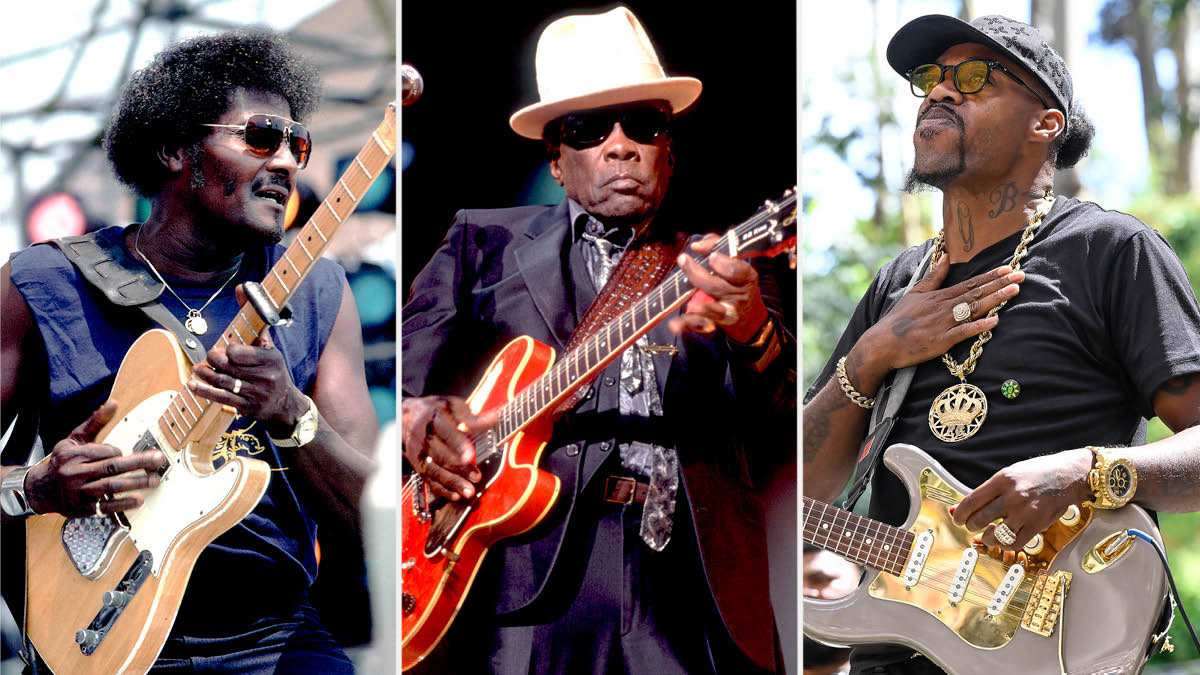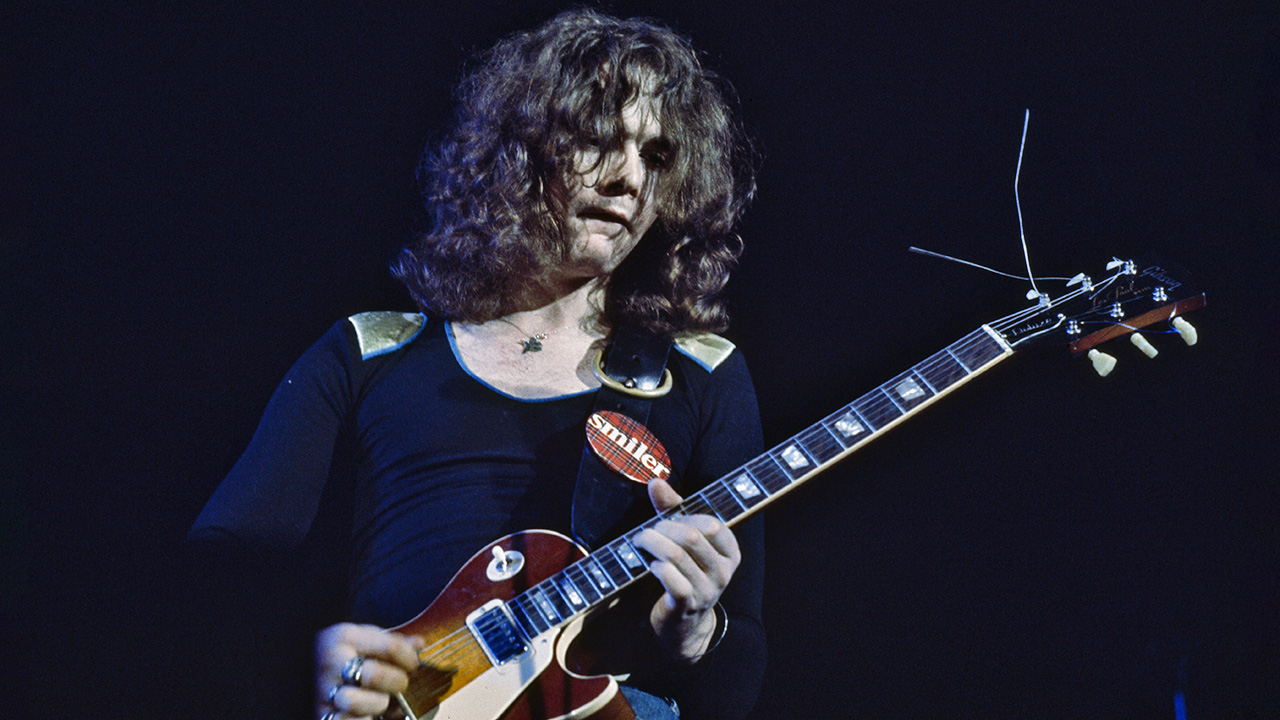“So well-versed in the art of blues that B.B. King said ‘he was like another one of my sons’”: 12 blues guitar albums that chart the genre – and the instrument’s – evolution
From Son House to Eric Gales, John Lee Hooker to Albert Collins, these classics highlight how blues guitar has changed over the years – its stories, tones and techniques all passed down and reinvented

All the latest guitar news, interviews, lessons, reviews, deals and more, direct to your inbox!
You are now subscribed
Your newsletter sign-up was successful
Caught the blues guitar bug bad but not sure what to listen to next? We’ve got you covered with 12 of the best albums from some of the greatest players to pick up the guitar.
But the following albums aren’t just a Best of the Blues kind of deal… No, we wanted to chart the evolution of the style, from where it started to how today’s players are reshaping it in real time.
It’s a list that takes us from Son House to John Lee Hooker, and includes seminal long-players from the likes of Eric Gales, Jeff Healey and the man they called the Ice Man, Mr Albert Collins.
1. T-Bone Walker – T-Bone Blues (1959)
That an album released 65 years ago can sound this fresh is testament to T-Bone Walker’s brilliance. Its two most famous tracks, T-Bone Shuffle and Call It Stormy Monday, highlight the jump jive and slow blues genius of the Texan singer-guitarist.
Brim-full of sliding 9th-chord rhythms and tasty 6th and 9th-infused licks and solos, they highlight Walker’s musicality, with Stormy Monday’s solo so modern-sounding it might have been recorded yesterday.
The title track, too, displays a cool swinging vibe with T-Bone laying back on the beat while spitting out streams of Gibson-toned licks. Every track is a masterclass.
Standout track: Call It Stormy Monday
All the latest guitar news, interviews, lessons, reviews, deals and more, direct to your inbox!
2. Howlin’ Wolf – Moanin’ In The Moonlight (1959)
A collection of ’50s singles, Moanin’ In The Moonlight contains more A-grade material than you could shake a six-stringed stick at. Although several different guitarists appear across the collection, most of the stand-out moments come from Willie Johnson and Hubert Sumlin, and there’s a real variety of tones, moods and styles to dig into.
Sumlin is credited with the mesmeric guitar hook of Smokestack Lightnin’ – a riff so good that it loops unchanged, aside from a just-perceptible increase in tempo, for three whole minutes – while Johnson contributed some ahead-of-his-time distortion and macho swagger to How Many More Years.
Standout track: Smokestack Lightnin’
3. John Lee Hooker – House Of The Blues (1959)
This Chess compilation holds 12 low-down and dirty cuts from the undisputed ‘King of the Boogie’. Although Eddie Kirkland performed secondary guitar on songs like Louise and High Priced Woman, the bulk of the collection saunters along under the raw insistence of Hooker’s infinitely-loopable one-chord rhythms and the casual accompaniment of a lone footstomp.
Stark arrangements, hypnotic thumb-and-index-finger grooves and sassy lead fills are Hooker 101, but there are some more experimental moments here, too. For example, Walkin’ The Boogie puts a radical twist on the earlier hit Boogie Chillen with a loose double-tracked vocal and and artificially sped-up lead overdub!
Standout track: Walkin’ The Boogie
4. Elmore James And The Broom Dusters Blues – After Hours (1960)
Few could deliver a blues with the passion of Elmore James. The only full-length album released during his lifetime, Blues After Hours kicks off with Dust My Blues, a raucous romp featuring Elmore’s trademark ‘diddy-diddly’ slide riff, with his Broom Dusters (including Ike Turner on guitar) in great form.
Mean And Evil has a swinging T-Bone Walker-style vibe with tasty non-slide licks, while No Love In My Heart features riffing horns and soulful lead. But it’s Goodbye Baby, a 12/8 slowie which mates Elmore’s mournful vocals with spine-chilling guitar, that seals his status as a true blues giant.
Standout track: Goodbye Baby
5. Let’s Hide Away And Dance Away With Freddy King – Freddie King (1961)
This all-instrumental album from the youngest of the three Kings (his name curiously spelled differently in the title) proved fertile picking for any budding blues guitarist. Eric Clapton and Peter Green covered Hide Away and The Stumble with John Mayall’s Bluesbreakers, but King’s versions sound more stately and authentic.
Freddie’s major and minor pentatonics, doublestops and sliding 6ths are all over the record, with San-Ho-Zay and Sen-Say-Shun firm favourites of Grateful Dead guitarist Jerry Garcia.
The gutsier tone of Side Tracked is a foretaste of how Freddie’s sound would evolve as the ’60s unfolded, but it’s a shame there’s no instrumental ballad here, and, of course, King’s raucous vocals are much missed.
Standout track: The Stumble
6. Son House – The Legendary Son House: Father of Folk Blues (1965)
Utilising dramatic bottleneck and fingerpicking techniques for self-accompaniment, Son House literally slid back into public consciousness during the ’60s folk revival with newly recorded collections such as this.
As a storyteller with some pretty visceral tales to tell, his style relied more on evocative physicality than technical finesse. Twanging, thumping and thwacking the strings, the raw gusto of his playing matched his emotive vocal delivery to a tee. Tone-wise, House was all about steel.
You’ll hear the slippery jangle (and occasional clunk) of a metal slide against steel strings as well as the characteristic reverberations of his 1930s National Duolian steel resonator guitar.
Standout track: Death Letter
7. Albert Collins – Ice Pickin’ (1978)
One of the standout blues guitar recordings of the late 1970s, Ice Pickin’ catapulted Collins into the major league, ready to enjoy the 1980s’ contemporary blues boom.
From funky upbeat grooves (Honey, Hush, Ice Pick) to swinging 12-bars (Avalanche) and the sultry slow blues of Cold, Cold Feeling, the album is notable for its stylistic breadth as well as the cool guitar tones that earned Collins the nickname ‘The Iceman’.
This penetrating signature sound came from a combination of factors: the neck pickup on his favourite 1966 Fender Telecaster, the open F minor tuning he used for much of the material, his frequent use of a capo way up the neck and the distinctive ‘snap’ of his fingerpicking attack.
Standout track: Cold, Cold Feeling
8. ZZ Top – Degüello (1979)
ZZ’s head honcho Billy Gibbons had his tongue in cheek behind that famous beard when he said: “For a guitarist such as myself, it’s easy to play the blues: you put your fingers in the right place on your guitar and the instrument does the rest.”
Joking aside, Gibbons’ mastery of blues phrasing is evident in his band’s early-’70s classics Jesus Just Left Chicago and Blue Jean Blues, and is captured in perfect clarity on A Fool For Your Stockings from Degüello, an album on which he also paid tribute to Robert Johnson and Elmore James with a cover of the deathless standard Dust My Broom.
Standout track: A Fool For Your Stockings
9. Robert Cray – Strong Persuader (1986)
Updating the blues from its roots into something slicker and more contemporary sounding in the mid-’80s, this mainstream breakthrough for the Strat-wielding Cray remains highly lauded to this day.
His clean fretwork on singles like Smoking Gun and Right Next Door (Because Of Me) led to an invite from Keith Richards to join Chuck Berry’s backing band and touring opportunities with the likes of Eric Clapton.
Having grown up watching originals like Albert Collins, Freddie King and Muddy Waters, Cray now himself stands as one of the elder statesmen who paved the way for what the blues has become.
Standout track: Smoking Gun
10. John Mayer – Continuum (2006)
Mayer achieved great things with his first two records, but it was the third that made him the electric blues hero we know today. It’s also the album that introduced the world to Slow Dancing In A Burning Room – a modern blues standard that’s been covered to death on stages and in bedrooms since its release.
Continuum also includes Mayer’s take on the Hendrix classic Bold As Love, and is notable for being the first album made with The Black One – a Custom Shop Strat made in late 2004 by master builder John Cruz, inspired by the singer/songwriter’s SRV signature and Fender’s heavily relic’d Rory Gallagher line.
Standout track: Slow Dancing In A Burning Room
11. Jeff Healey – Mess Of Blues (2008)
The blind Canadian guitarist – who would often perform seated, with his fretting hand over the neck like a lap-steel player – was so well-versed in the art of blues that B.B. King said “he was like another one of my sons”.
Likewise, Stevie Ray Vaughan once admitted that Healey had “deeper roots than I probably have”.
Mess Of Blues, released less than a fortnight after Healey’s passing in 2008, comprises four live tracks and six studio recordings, with electrifying renditions of famous works by Freddie King, Hank Williams and Neil Young, and an unforgettable elongated version of the B.B. ballad How Blue Can You Get.
Standout track: How Blue Can You Get
12. Eric Gales – Crown (2022)
“My name is Eric Gales, any questions?” asks the blues supremo at the beginning of Crown. Well, come to think of it, there are a few – mainly centred around how one player can exude such an impossible amount of talent.
Plugging his Magneto signature guitar into his DV Mark Raw Dawg guitar amp, the American guitarist’s chord voicings and leads are nothing short of breathtaking on tracks like The Storm, Stand Up and Too Close To The Fire.
And of course, there’s that headline-stealing collaboration with Joe Bonamassa on I Want My Crown – a tour de force from two giants of modern blues.
Standout track: I Want My Crown
Since graduating university with a degree in English, Ellie has spent the last decade working in a variety of media, marketing and live events roles. As well as being a regular contributor to GuitarWorld.com, she currently heads up the marketing team of a mid-scale venue in the south-west of England. She started dabbling with guitars around the age of seven and has been borderline obsessed ever since. She has a particular fascination with alternate tunings, is forever hunting for the perfect slide for the smaller-handed guitarist, and derives a sadistic pleasure from bothering her drummer mates with a preference for wonky time signatures.







